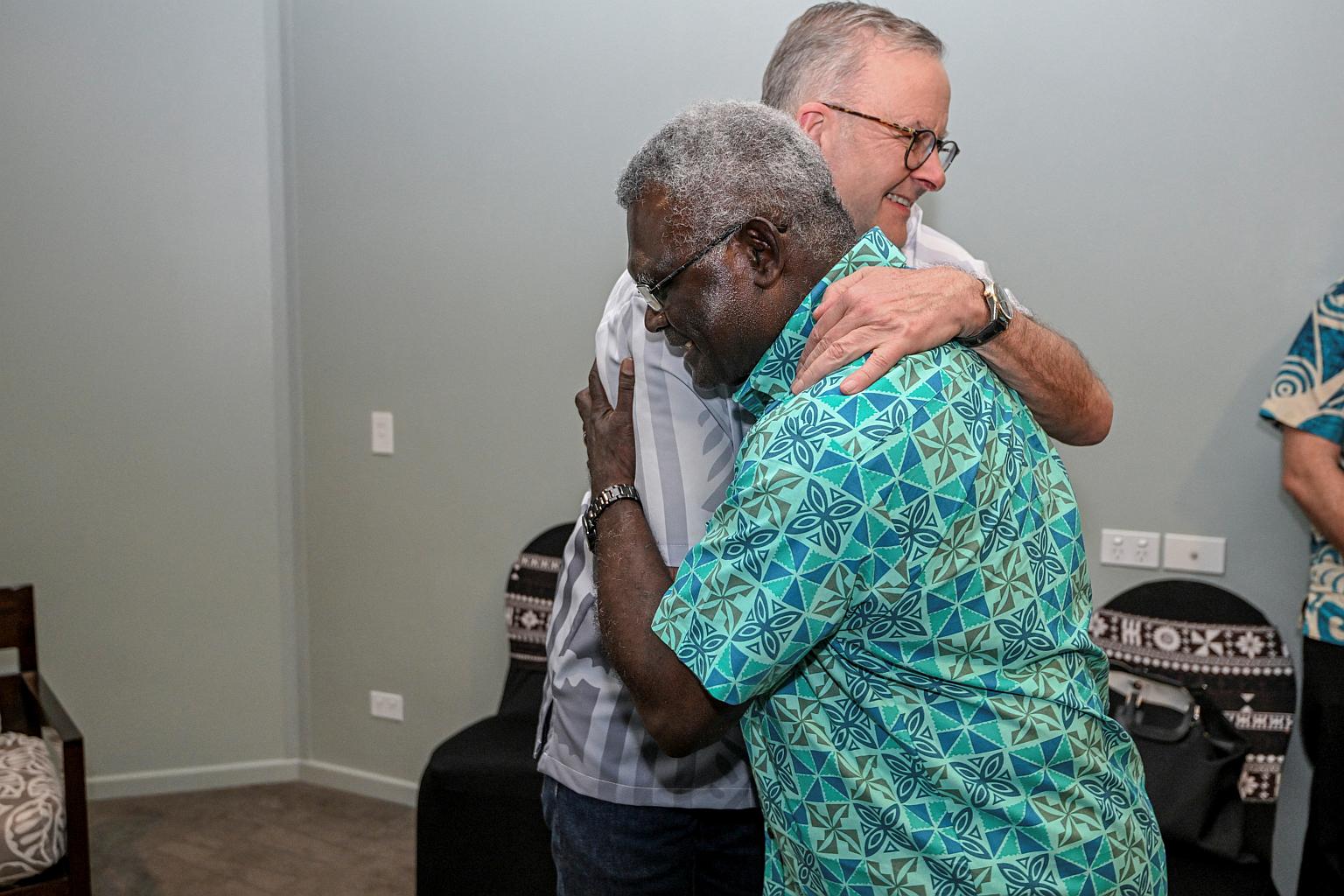Solomon Islands rules out China military base as Pacific leaders try to focus on climate over geopolitics
Sign up now: Get insights on Asia's fast-moving developments

Australia's PM Anthony Albanese (left) hugging Solomon Islands' PM Manasseh Sogavare at the bilateral meeting in Suva on July 13, 2022.
PHOTO: REUTERS
Follow topic:
SYDNEY – Australia and New Zealand secured a diplomatic victory at a meeting of Pacific leaders this week as they received a guarantee from Solomon Islands that it will not allow a Chinese base to be built on its territory.
The meeting of Pacific Islands Forum (PIF) leaders in Fiji this week has been one of the most closely watched in the grouping’s 51-year history amid rising tensions over China’s growing influence, as well as concerns among low-lying Pacific states about the need for stronger international climate action change.
In recent weeks, the Pacific region has experienced a flurry of diplomatic activity as Australia and the United States have led efforts to counter China’s growing outreach in the region.
China signed a secretive security deal with Solomon Islands in April that raised concerns in Canberra, Washington and Wellington, which feared it could lead to the construction of a military base.
China later tried to convince 10 Pacific states to sign a wide-ranging economic and security deal - an offer that the Pacific states declined.
But PIF leaders at this week’s summit appeared to be determined to demonstrate that geopolitical rivalries would not undermine the group’s emphasis on consensus-building.
This was evident at a long-awaited meeting on Wednesday (July 13) between Solomon Islands Prime Minister Manasseh Sogavare and Australian Prime Minister Anthony Albanese.
As Mr Albanese held out his arm for a handshake, Mr Sogavare cried “I need a hug”. The pair warmly embraced, apparently putting aside Mr Sogavare’s recent suggestion that the relationship had “soured”.
As the summit closed on Thursday, Mr Sogavare explicitly stated that his deal with Beijing will not allow a Chinese base, saying that such a move could make his nation a military target.
“The moment we establish a foreign military base, we immediately become an enemy,” he told a group of reporters. “And we also put our country and our people as targets for potential military strikes. (The) Solomon Islands government will never allow our country and people to become military targets.”
Mr Sogavare said Australia remains his country’s “security partner of choice” and he would call on Beijing for support only if Canberra could not meet his country’s security needs.
In the past two decades, Australia has deployed large security contingents to Solomon Islands to help it to quell bouts of unrest and to support peacekeeping operations.
Mr Albanese on Thursday welcomed Mr Sogavare’s comments, saying he had been strongly opposed to a potential Chinese base in Solomon Islands.
“Obviously, the interests of Australia would not be served by having a military base so close to where Australia is and so close to where Queensland is,” he told Channel Nine.
New Zealand Prime Minister Jacinda Ardern also supported Mr Sogavare’s position, saying the pair had agreed on the need to reduce militarisation in the Pacific.
Australia and New Zealand are the two largest members of PIF.
The forum this year did not invite dialogue partner countries such as the US, China and Japan to attend, in a bid to ensure that the gathering did not become an outlet for geopolitical tensions.
In recent years, Australian ties with Pacific states have frayed over Canberra’s refusal to adopt ambitious climate policies. But Mr Albanese, who was elected in May, has signalled that he is committed to stronger carbon emission reduction targets and shares the region’s concerns about the risk of inaction.
His stance has helped to improve ties, though Pacific leaders are urging Australia to do more.
Fiji’s Prime Minister, Mr Frank Bainimarama, who hosted this week’s summit, shared an image on social media of his warm handshake with Mr Albanese.
Welcoming Australia’s new climate commitments, Mr Bainamarama noted: “I have urged @AlboMP to go further for our family’s shared future by aligning Australia’s commitment to the 1.5 deg C target.”
The Pacific nation of Vanuatu led a campaign at the summit to urge the International Court of Justice for a landmark advisory opinion on the need for the international community to protect future generations from the impacts of climate change.
Notably, Mr Albanese said he supported the “broad concept” behind Vanuatu’s proposal but wanted to see further details.

